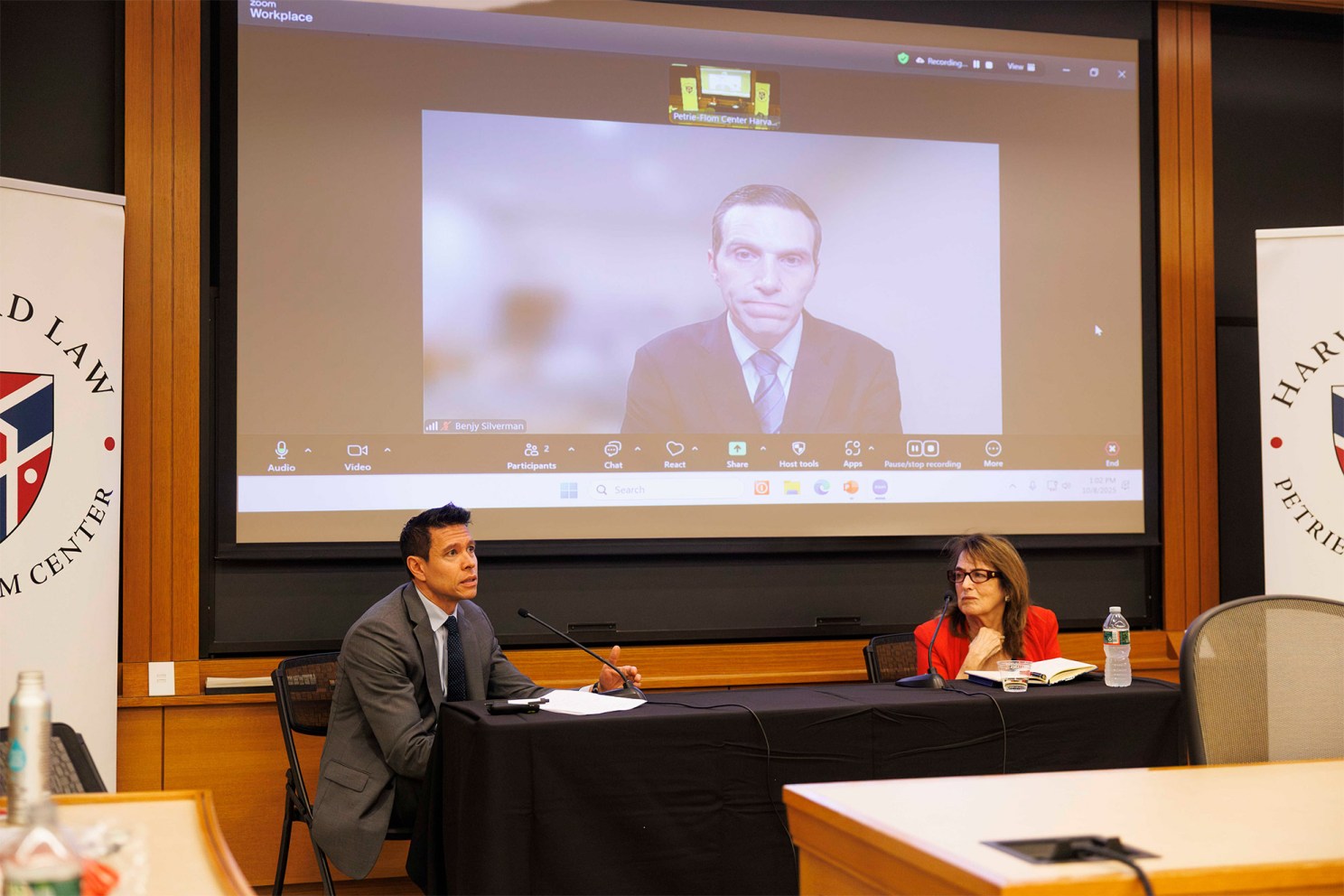Time for mandatory retirement ages for lawmakers, judges, presidents?

Francis Shen, Benjamin Silverman (on screen), and Nancy Gertner.
Niles Singer/Harvard Staff Photographer
Americans seem to mostly say yes; legal, medical scholars point to complexities of setting limits
Many professions come with mandatory retirement ages but not so for federal judges and lawmakers, with many remaining on the job well into their 70s and 80s.
That could be ripe for a change as concerns increase over cognitive decline among aging leaders and jurists, said experts during a Wednesday panel titled “How Old is Too Old to Govern?”
“There may well be, particularly now, a movement to have age limits or term limits for judges,” said retired federal judge Nancy Gertner, senior lecturer on Law at Harvard Law School, at the event sponsored by the Petrie-Flom Center. “They exist everywhere else in the world and in the majority of states. The Supreme Court’s lack of either an age limit or a term limit is really unusual.”
Questions about the graying of the nation’s leaders became a major campaign issue in recent elections, most notably in the races for the nation’s commander in chief. Former president Joe Biden was 82 at the end of his presidency, and Donald Trump, at 78, became the oldest person to be inaugurated as president for his second term.
The issue is widespread.
Both Republicans in the Senate and Democrats in the House were led until recently by octogenarians; Republican Senator Mitch O’Connell announced his retirement on his 83rd birthday, and Democratic Congresswoman Nancy Pelosi will be 86 at the end of her term in 2027. The average age of a member of Congress is about 59.
On the Supreme Court, Justices Clarence Thomas (77) and Samuel Alito (75) are the most senior on the bench, followed by Sonia Sotomayor (71) and Chief Justice John Roberts (70).
According to the Federal Judicial Center, in 2024, the average age of U.S. federal judges was 67.68 years.
Most Americans support age limits for both politicians and Supreme Court justices, according to a report from the Pew Research Center, but that would require a constitutional amendment.
The U.S. Constitution sets 35 as the minimum age for president, 30 for senators, and 25 for representatives, but it does not set a maximum age limit. The document specifies neither minimum nor maximum age for Supreme Court justices.
During his remarks, Francis X. Shen, professor of law at the University of Minnesota, and member of Harvard Medical School Center for Bioethics, pointed to a New York Times article that reported that more than a fifth of members of Congress are 70 years old and older.
“There are more people in Congress who are older than ever before,” said Shen, who moderated the event.
In the case of aging judges, some states have tackled the issue already. Thirty-two of 50 impose a mandatory retirement age, according to an article by the National Center for State Courts.
“The upside of that is that it’s administratively very easy. All you need is a birth certificate and a calculator,” Shen said. “The second upside is you reduce, though not entirely, some concerns about cognitive decline in older ages.”
Worldwide, most countries have either a compulsory retirement age for justices in their highest court — which ranges from 60 to 75 years — or term limits.
To address the issue of aging politicians, Shen discussed the possibility of a mandatory disclosure of cognitive assessments, similar to financial disclosures, to provide voters with additional information.
Benjamin C. Silverman, assistant professor of psychiatry and member of the Center for Bioethics at Harvard Medical School, highlighted the difficulties in assessing cognitive impairment, including the vast individual variation in cognitive decline, the variability in cognitive reserve among individuals, and the lack of a baseline neurocognitive functioning assessment.
“The biggest challenge to assessing cognitive impairment is lacking a baseline assessment,” said Silverman. “As we get older, if we display some sort of cognitive challenges, someone might say, ‘Let’s do some neuropsychological testing,’ but without the ability to compare that to something, without being able to see a trajectory, it’s really hard to know what to do with it.”
Gertner retired at 65 in 2011 to pursue other career options, including teaching and writing. She says imposing a retirement age on judges would ultimately be more effective, although she echoed the notion of the complications in setting one.
Individualized cognitive assessments might pose risks in implementation due to potential bias, but also because there isn’t agreement on how to assess cognitive impairment in judges, she said.
“If we don’t have an agreement on what comprises cognitive decline, I’m not sure that I feel comfortable about a cognitive test,” said Gertner. “What is the marker of individualized decline in our incredibly divided world, where judges are under attack?”
Gertner believes that mandatory retirement age for judges, including Supreme Court justices, would help avoid public debates about cognitive decline and also help the court regain some public support, which has dropped to “near historic lows,” according to a recent Pew report.
“I stand for retirement age, particularly for the Supreme Court justices,” said Gertner. “There is another generation coming down the pipe … and the retirement age should address the issue of cognition, but also the issue of democratic legitimacy.”




